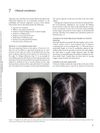 65 citations,
July 2013 in “International Clinical Psychopharmacology”
65 citations,
July 2013 in “International Clinical Psychopharmacology” Mood stabilizers like lithium and anticonvulsants have side effects that can lead to patients stopping their medication, and managing these effects is important for treatment adherence.
 40 citations,
August 2018 in “Skin appendage disorders”
40 citations,
August 2018 in “Skin appendage disorders” Some alternative treatments for hair loss might work, but more research is needed.
 30 citations,
June 2019 in “Frontiers in Endocrinology”
30 citations,
June 2019 in “Frontiers in Endocrinology” The document concludes that managing non-classical congenital adrenal hyperplasia in females requires personalized treatment, genetic counseling, and a team of specialists.
 30 citations,
November 2008 in “Facial Plastic Surgery”
30 citations,
November 2008 in “Facial Plastic Surgery” The conclusion is that the best approach for treating Female Pattern Hair Loss is a combination of different treatments.
 27 citations,
May 2016 in “Dermatologic Surgery”
27 citations,
May 2016 in “Dermatologic Surgery” Male faces age with more wrinkles and hair loss, influenced by both body changes and environmental factors.
 23 citations,
October 2016 in “Journal of Midwifery & Women's Health”
23 citations,
October 2016 in “Journal of Midwifery & Women's Health” The document concludes that health care providers should offer culturally competent care and more research is needed to improve health outcomes for transgender individuals.
 3 citations,
July 1997 in “Current problems in dermatology”
3 citations,
July 1997 in “Current problems in dermatology” Hair restoration surgery has evolved over time, with a focus on natural-looking results and managing patient expectations, while also considering potential complications and the lifelong progression of male pattern baldness.
 May 2020 in “bioRxiv (Cold Spring Harbor Laboratory)”
May 2020 in “bioRxiv (Cold Spring Harbor Laboratory)” The study found that certain genes are important for hedgehog skin appendage development and immunity, with spines possibly evolving for protection and infection resistance.
 January 2009 in “Springer eBooks”
January 2009 in “Springer eBooks” The document concludes that treating skin conditions should include psychological care and a multidisciplinary approach is essential for effective management.
 September 2016 in “Springer eBooks”
September 2016 in “Springer eBooks” Looking older on the outside might be linked to aging faster on the inside and can be affected by lifestyle choices and health risks.
81 citations,
December 2007 in “Acta materialia” AFM helped show how hair changes under tension and the effects of damage and conditioner.
 41 citations,
June 2018 in “Medicine Health Care and Philosophy”
41 citations,
June 2018 in “Medicine Health Care and Philosophy” The article suggests using four questions to tell apart necessary medicalization from excessive medicalization, focusing on problem significance, social expectations, medical understanding, and effective resolution.
 1 citations,
May 2021 in “BMC Proceedings”
1 citations,
May 2021 in “BMC Proceedings” The document concludes that more research is needed to reduce frequent hospital visits, addiction medicine education improves with specific training, early breast cancer surgery findings are emerging, nipple smears are not very accurate, surgery for older melanoma patients doesn't extend life, a genetic condition in infants can often be treated with one drug, doctors are inconsistent with blood clot medication, a certain gene may protect against cell damage, muscle gene overexpression affects many other genes, and some mitochondrial genes are less active in mice with tumors.
 1 citations,
April 2012 in “Informa Healthcare eBooks”
1 citations,
April 2012 in “Informa Healthcare eBooks” The conclusion is that detailed clinical descriptions help pathologists diagnose hair loss conditions more accurately.
 January 2023 in “International Journal of Dermatology and Venereology”
January 2023 in “International Journal of Dermatology and Venereology” Many people experienced hair loss after having COVID-19, with the worst cases in hospitalized patients, and some saw hair regrowth within six months.
 November 2022 in “Skin health and disease”
November 2022 in “Skin health and disease” People with hair loss conditions often have more mental health issues like depression and anxiety compared to those without hair loss.
61 citations,
October 2011 in “Experimental dermatology” Scalp itching is common and hard to diagnose due to the complex nerve structure of the scalp.
 1 citations,
October 2022 in “Annual review of cell and developmental biology”
1 citations,
October 2022 in “Annual review of cell and developmental biology” The nervous system helps control stem cell behavior and immune responses, affecting tissue repair and maintenance.

Early-onset baldness is linked to genetics, lifestyle, and can indicate higher risk for heart and metabolic diseases, and affects mental health.
 November 2023 in “Plastic and Reconstructive Surgery – Global Open”
November 2023 in “Plastic and Reconstructive Surgery – Global Open” Americans see hair transplants as valuable for treating hair loss and want them to be more affordable and tailored to each gender.
 November 2022 in “Journal of clinical images and medical case reports”
November 2022 in “Journal of clinical images and medical case reports” COVID-19 can cause hair loss in both severe and mild cases, often affecting women.
4 citations,
January 2010 in “Elsevier eBooks” Natural ingredients are seen as safe and effective in cosmetics, and plant tissue culture is becoming key for ingredient supply.
 1 citations,
July 2017 in “PubMed”
1 citations,
July 2017 in “PubMed” Hair loss can have negative psychological effects and treating it needs teamwork, especially from skin doctors.
 October 2024 in “Cosmoderma”
October 2024 in “Cosmoderma” Proper hair care and suitable products are essential for men's scalp health and well-being.
 August 2024 in “EMJ Dermatology”
August 2024 in “EMJ Dermatology” Non-scarring alopecia in females affects emotional well-being and requires accurate diagnosis and personalized treatment.
2 citations,
January 2019 in “Journal of Cosmetics, Dermatological Sciences and Applications” The supplement and lotion significantly reduced hair loss and improved hair health.
 January 2020 in “Journal of Cosmetics, Dermatological Sciences and Applications”
January 2020 in “Journal of Cosmetics, Dermatological Sciences and Applications” DEEPLY ROOTED® supplement seems to effectively improve hair growth and quality in women with no side effects.
201 citations,
November 2002 in “Annals of internal medicine” Use NSAIDs for immediate migraine relief and β-blockers for prevention; tailor treatment to the individual.
 34 citations,
September 2019 in “Clinical, Cosmetic and Investigational Dermatology”
34 citations,
September 2019 in “Clinical, Cosmetic and Investigational Dermatology” Light therapy can stimulate hair growth and is more effective when started early, but more research is needed on its long-term effects and optimal use.
 11 citations,
July 2010 in “Journal of the American Academy of Orthopaedic Surgeons”
11 citations,
July 2010 in “Journal of the American Academy of Orthopaedic Surgeons” PRP treatments have shown mixed results for healing, and future research should focus on how PRP is used and which type is used.
























